OKRs Training Course
OKR Course in Singapore
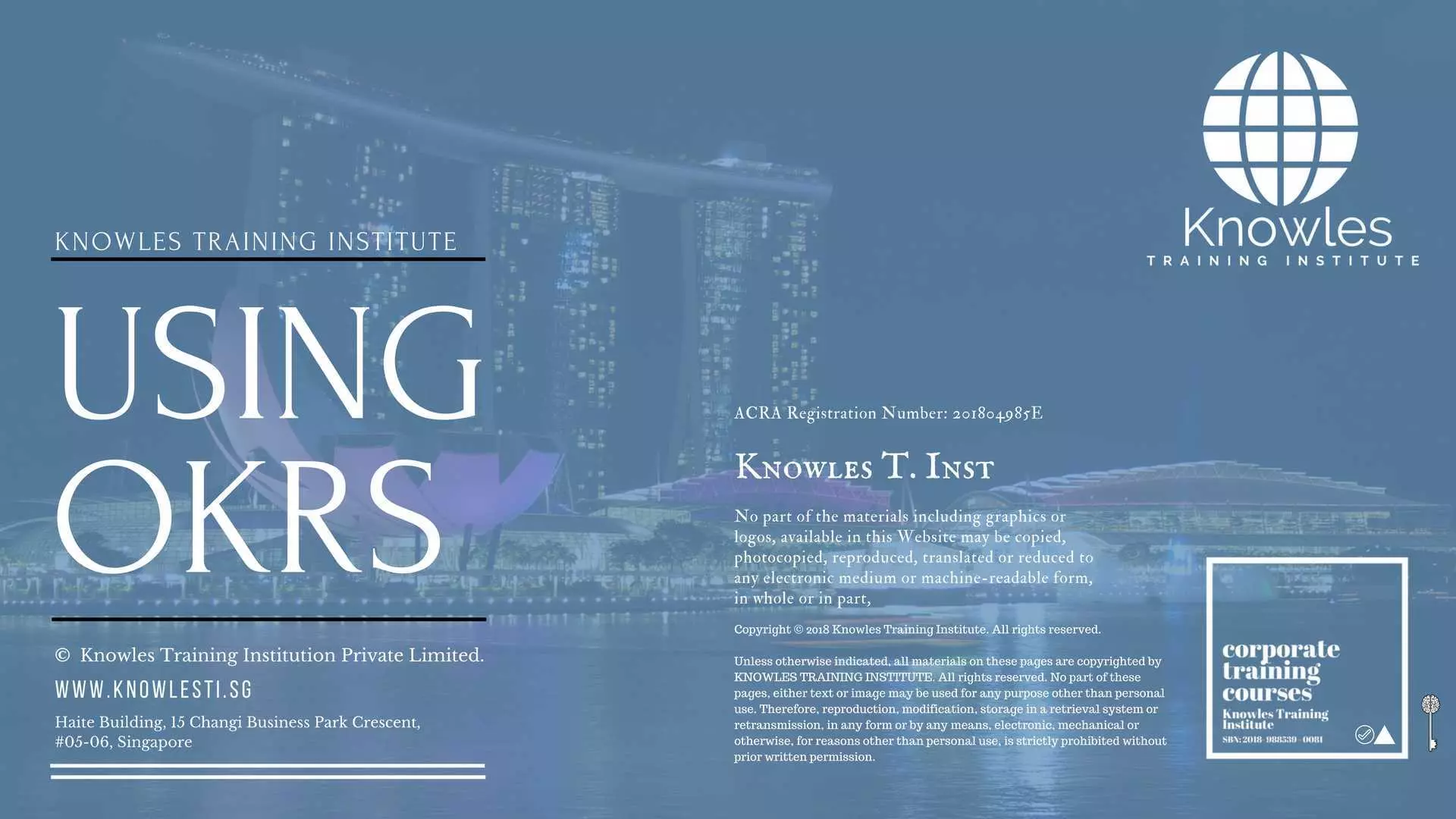
About This Using OKR Training Course
Using OKR Course in Singapore
When you are a part of a large company, it’s easy to feel out of the loop. To address this, big companies like Intel and Google use OKRs, or Objectives and Key Results methodology, to communicate goals effectively throughout the firm, thus, promoting common language, transparency, accountability, and alignment. Read on and find out how these key reasons contribute largely to a firm’s success.
Objectives and key results (OKR) is a structure for establishing and tracking objectives and their results. The evolution of OKRs is attributed to Andy Grove, who is known as the Father of OKRs. He injected the approach to Intel during his time there and documented this in his book High Output Management. John Doerr explains grove’s easy but effective concept: “The key result has to be measurable. But in the end, you can look, and without any arguments: Did I do that or did I not do it? Yes? No? Easy. No judgments in it.”
OKR include an objective which is a clearly defined goal and one or more key results which are distinct measures used to track the achievement of that goal. The aim of OKR is to distinguished how to achieve objectives through concrete, specific as well as measurable actions. Key results can be measured on a scale of 0 to 100 or any numerical unit such as a dollar amount, percentage, items, clients. Objectives should also be backed by initiatives, which are the projects and activities that serve to achieve the objective and move forth the key results.
In 1975, John Doerr, who was a salesperson working for Intel, went for a course within Intel trained by Andy Grove where he was presented to the theory of OKRs. In 1999 Doerr, who was then working for a company called Kleiner Perkins which is a venture capital firm, introduced the concept of OKRs to a start-up Kleiner Perkins had invested in called Google. The idea took hold, and OKRs soon became the centre to Google’s culture as a “management methodology that helps to make sure that the company concentrates efforts on the same critical issues throughout the organization.” Doerr also wrote a book about the OKR framework titled “Measure What Matters”.
Larry Page, who is the CEO of Alphabet and co-founder of Google credited OKRs within the foreword to Doerr’s book: “OKRs have assisted and lead us to 10x growth, many times over. They’ve assisted our crazily bold mission of ‘organizing the world’s information’ perhaps even achievable. They’ve kept the rest of the company and me on time and on track when it mattered the most.”
Since becoming public at Google, OKRs have found favour with various other similar tech start-up organizations including LinkedIn, Twitter, Uber and Gett. OKRs may be shared throughout the company with the intention of providing teams with clarity of goals with the intention to align and focus effort. OKRs are typically set at the company, team, and personal levels, although there is a critique on this creating too much of a waterfall approach, which, OKRs strives to be the opposite. OKRs overlay with other performance management frameworks – in terms of complexity lying somewhere between KPI and the balanced scorecard. The important advantages of OKRs are focus, alignment and engagement.
Course Schedule
| COURSES | DATES | TIME | VENUE | COUNTRY | REGISTRATION |
|---|---|---|---|---|---|
| OKR Course | 22 May, 2024 - 24 May, 2024 | 9 am to 5 pm | Online / Face to Face | Singapore | |
| OKR Course | 23 June, 2024 - 24 June, 2024 | 9 am to 5 pm | Online / Face to Face | Singapore | |
| OKR Course | 23 July, 2024 - 24 July, 2024 | 9 am to 5 pm | Online / Face to Face | Singapore | |
| OKR Course | 23 August, 2024 - 24 August, 2024 | 9 am to 5 pm | Online / Face to Face | Singapore | |
| OKR Course | 21 September, 2024 - 22 September, 2024 | 9 am to 5 pm | Online / Face to Face | Singapore | |
| OKR Course | 21 October, 2024 - 22 October, 2024 | 9 am to 5 pm | Online / Face to Face | Singapore | |
| OKR Course | 21 November, 2024 - 22 November, 2024 | 9 am to 5 pm | Online / Face to Face | Singapore | |
| OKR Course | 21 December, 2024 - 22 December, 2024 | 9 am to 5 pm | Online / Face to Face | Singapore |
Who Should Attend This Using Okrs Workshop
This Using Okrs workshop is ideal for anyone who would like to gain a strong grasp and improve their Using Okrs.
All Staff Within An Organisation
Managers
Team Leaders
Executives
Assistants
Officers
Secretaries
Group Size For This Using Okrs Training Program
The ideal group size for this Using Okrs course is:
Minimum: 5 Participants
Maximum: 15 Participants
Course Duration For This Using Okrs Skills Course
The duration of this Team-Specific Motivation workshop is 2 full days. Knowles Training Institute will also be able to contextualised this workshop according to different durations; 3 full days, 1 day, half day, 90 minutes and 60 minutes.
2 Full Day
9 a.m to 5 p.m
Using Okrs Course Benefits
Below is the list of course benefits of our Using Okrs course
1. Alignment within the organisation and cross-functional cooperation: The value of shared OKRs promotes collaboration among various teams, resolving interdependencies and unifying opposing initiatives.
Using Okrs Course Objectives
Below is the list of course objectives of our Okrs Course
OKR Module 1: Introduction to OKRs
OKR Module 2: OKRs Preparation
OKR Module 3: Creating The “O” in OKR
OKR Module 4: Creating “KR” in OKR
OKR Module 5: The OKR Blueprint
OKR Module 6: Creating Alignment
OKR Module 7: OKR Management
OKR Module 8: OKR Case Studies
Course Content For This Using Okrs Training Course
Below is the list of course content of our Okrs training programme
OKR Module 1: Introduction to OKRs
- What are OKRs
- List the Benefits of OKR
- Who Created The OKR Framework
- The Main Purpose of OKR
- Define Objectives
- Define Key Results
- The Main Difference Between OKR and KPI
- The OKR Framework in a Nutshell
- A Typical OKR Template
OKR Module 2: OKRs preparation
- Question yourself
- OKR developmental Plan
- Choosing Your OKR Cadence
- Top Down or Bottom Up
- How Often is OKR Set
- Roadmap Strategy of OKR
OKR Module 3: Creating The “O” in OKR
- Describing your Objectives
- How far should you stretch your Objectives
- Important things to take note of when creating your Objectives
OKR Module 4: Creating “KR” in OKR
- Examples of the different types of Key Results
- Characteristics of Key Results
- Why Do Key Results Have To Be Measurable
- Important things to take note of when creating your Key Results
OKR Module 5: The OKR Plan
- The OKR Scoring System
- How often should you be setting your OKR
- Listing down the number of OKRs
- OKR Examples by Roles
OKR Module 6: Creating Alignment
- Why create alignment
- Shared OKRs
- 360 Degree Alignment
- Connecting your OKR
OKR Module 7: OKR Management
- How To Track Your OKRs
- Spreadsheet vs.Online Softwares
- List of Online OKR Tracking Softwares
- When to Check-in
- How Often to Check-in
- OKRs & CFRs – Continuous Performance Management Approach
- Should You Tie OKR to Compensation
- Common OKR Mistakes & How to Avoid Them
OKR Module 8: OKR Case Studies
- OKR Case study 1: Setting Company OKRs
- OKR Case Study 2: Setting Team OKRs
- OKR Case Study 3: Setting Individual OKRs
Using Okrs Value Added Materials
Each participant will receive the following materials for the Using Okrs course
Using Okrs Learner’s Guide
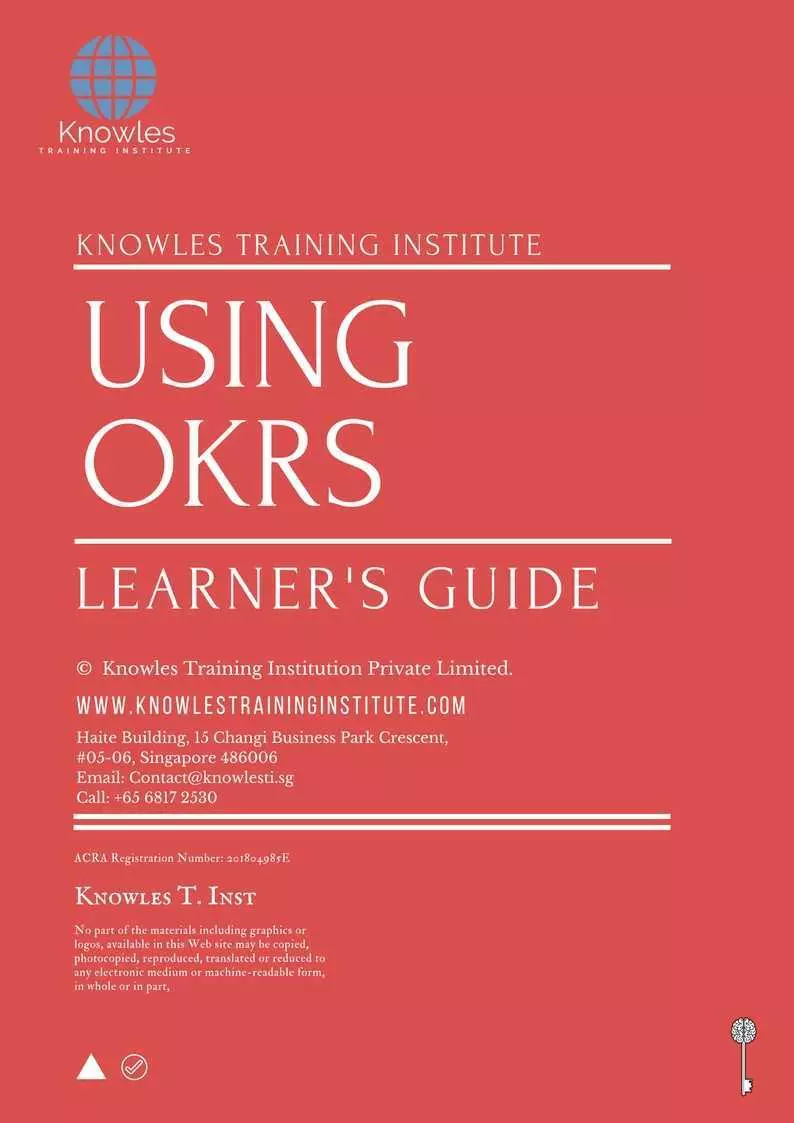
Using Okrs Key Takeaways Notes
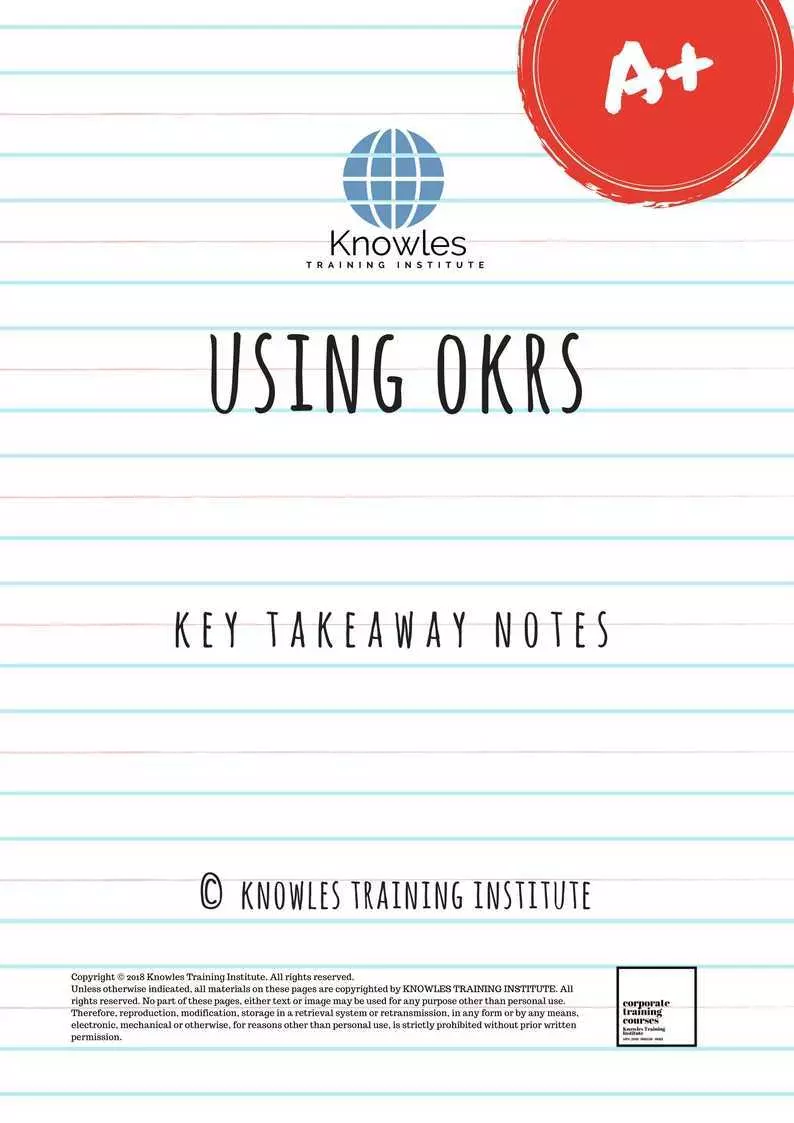
Using Okrs Essentials Ebook
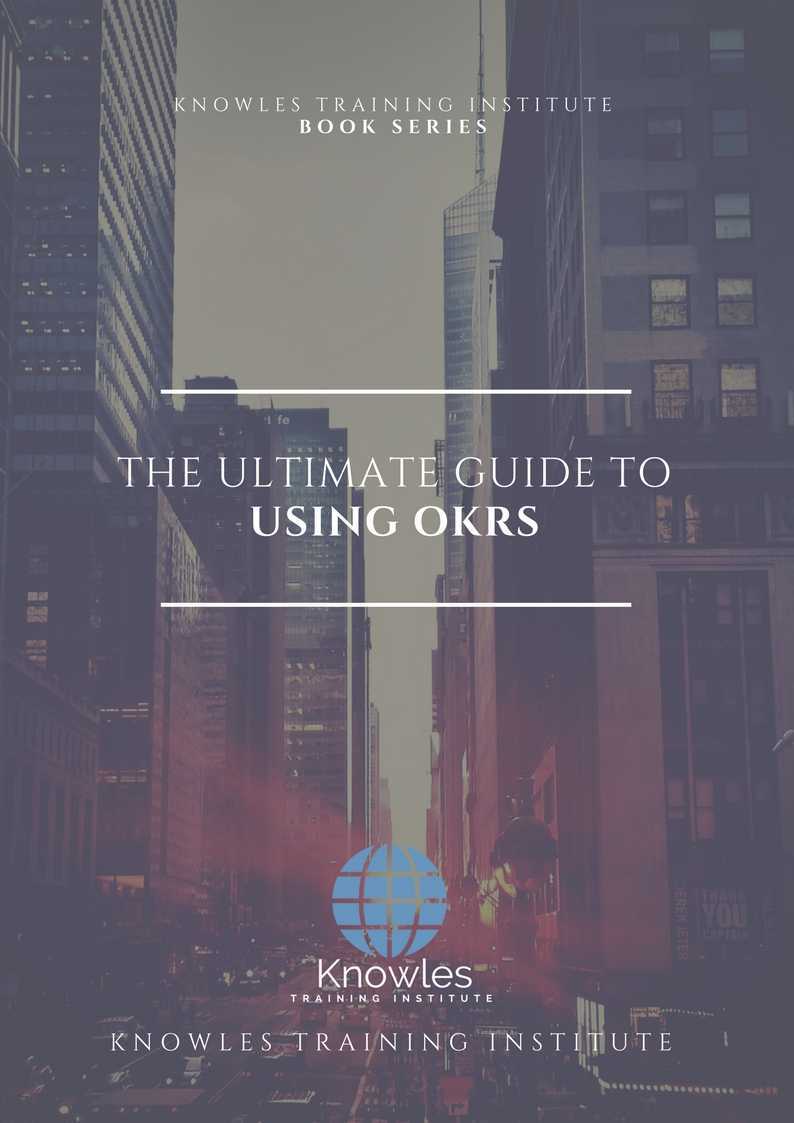
Using Okrs Course Handouts
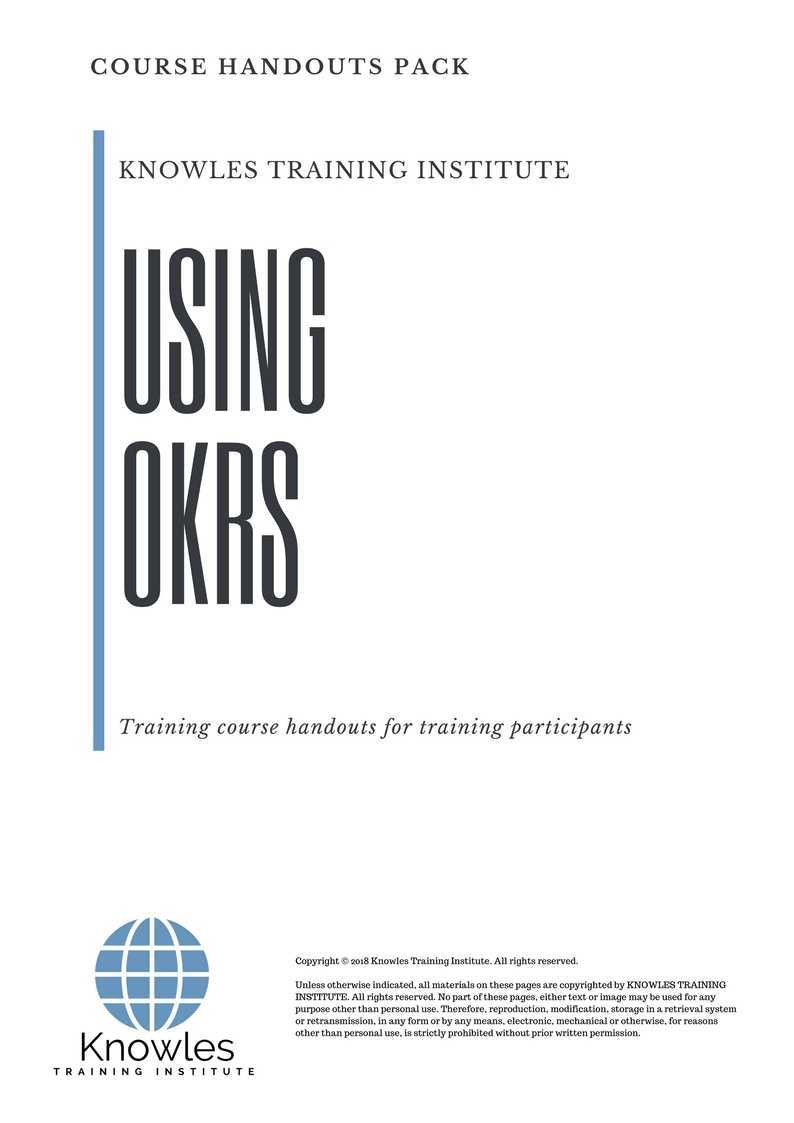
Using Okrs 30-Day Action Plan

Using Okrs MindMaps Pack

Using Okrs PPT Slides Used During Course
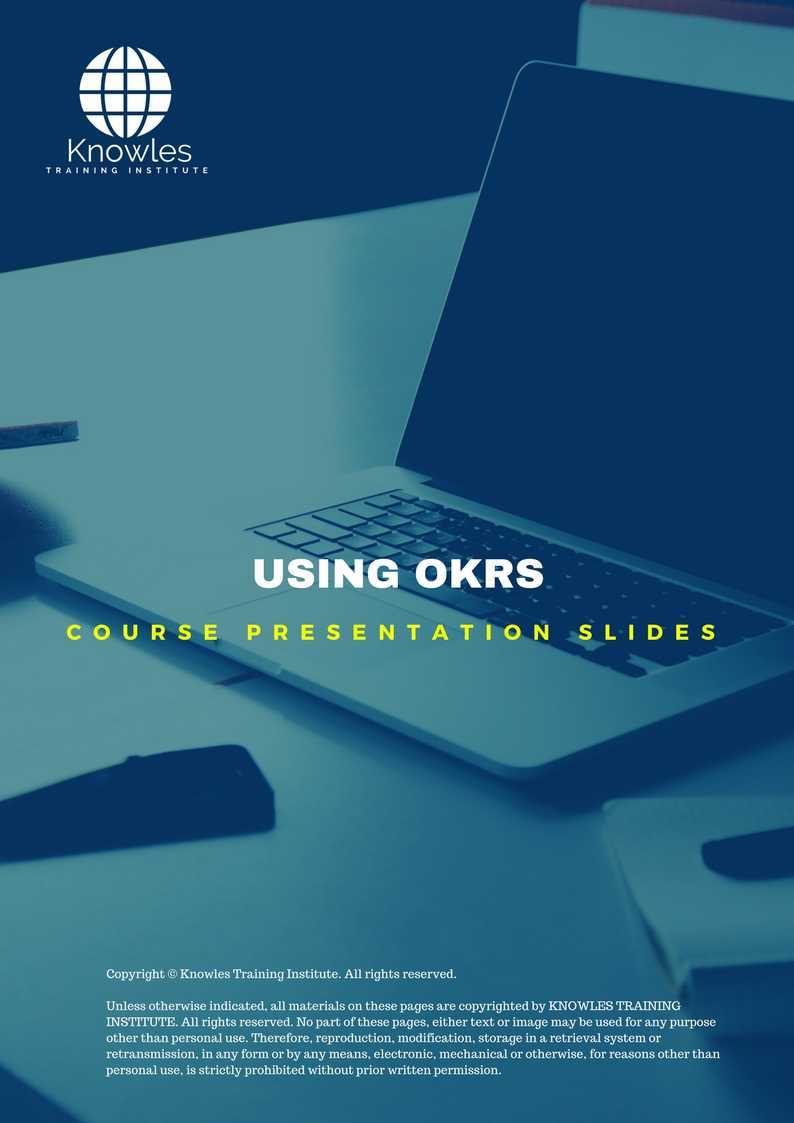
Using Okrs Long-Term Memory Flashcards Pack
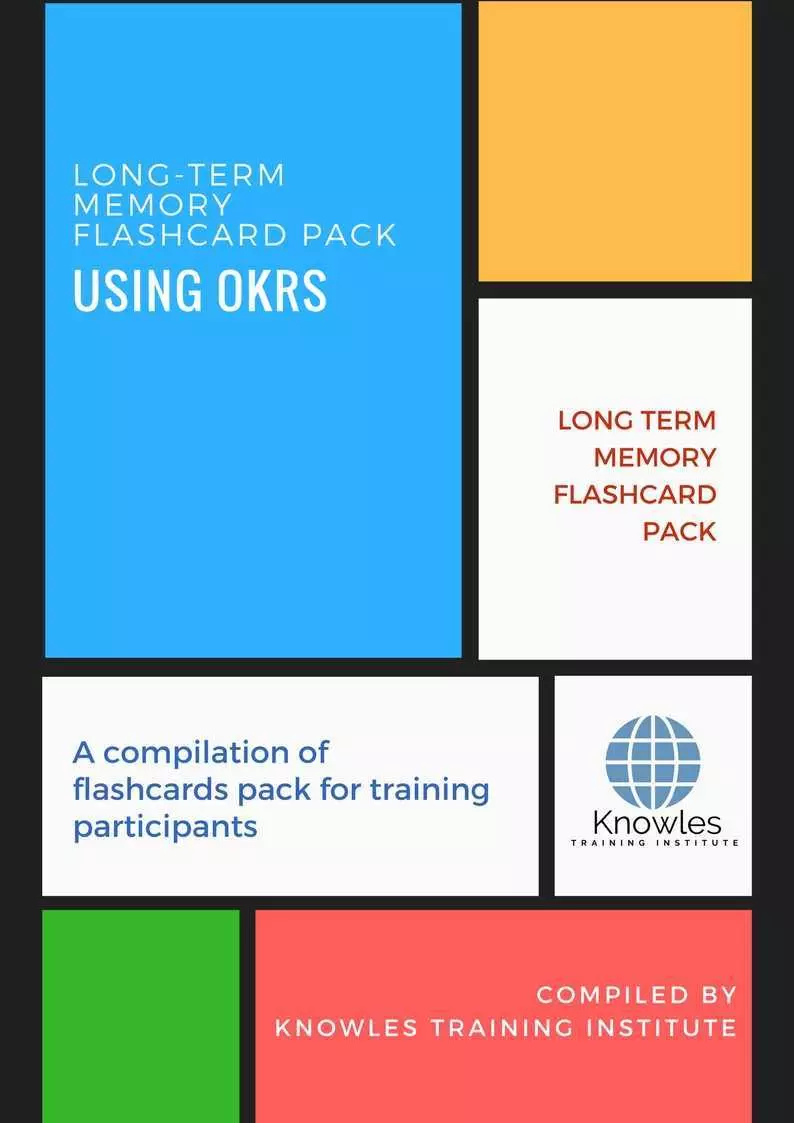
Using Okrs E-Learning Course
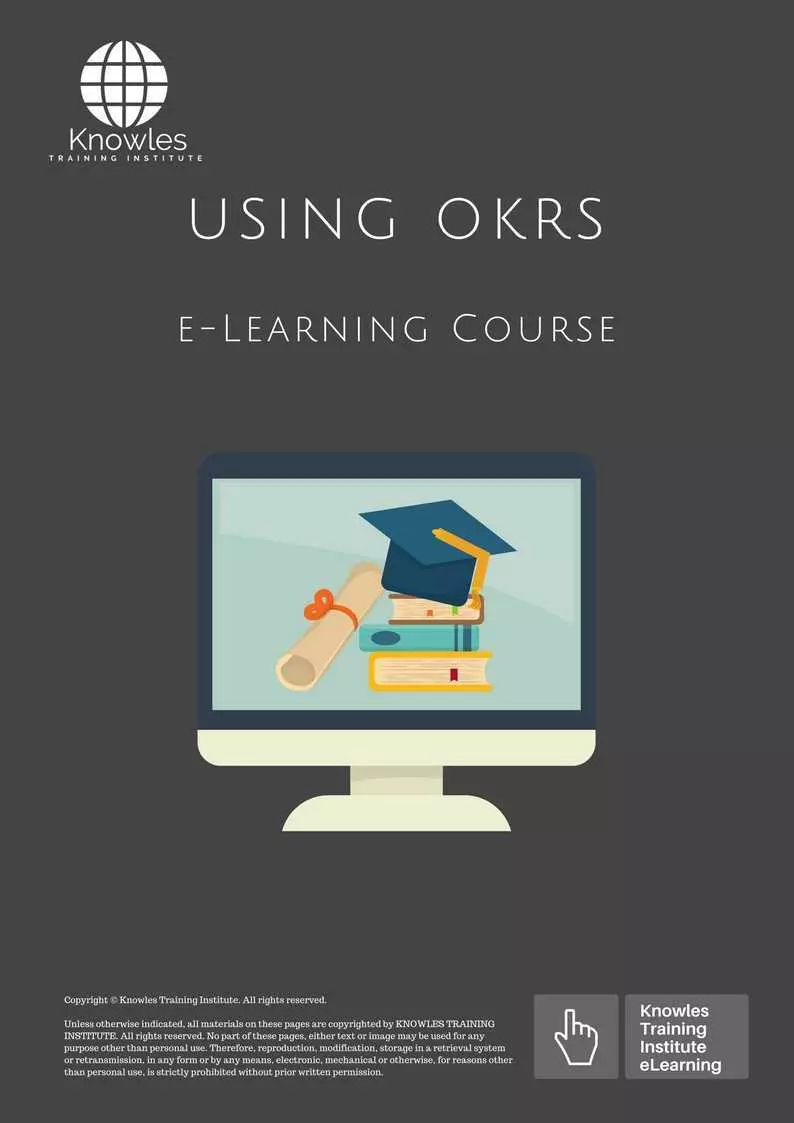
Using Okrs Online Video Course

Using Okrs Essentials Audiobook
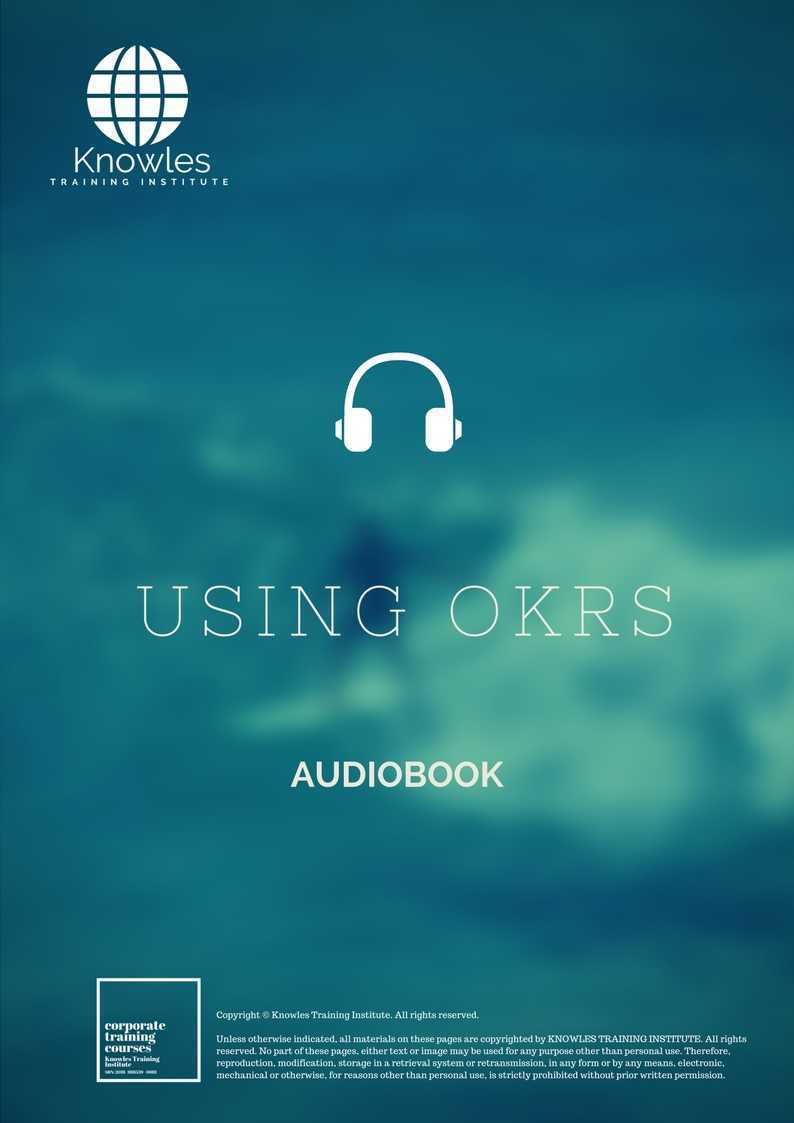
Using Okrs Infographics Pack
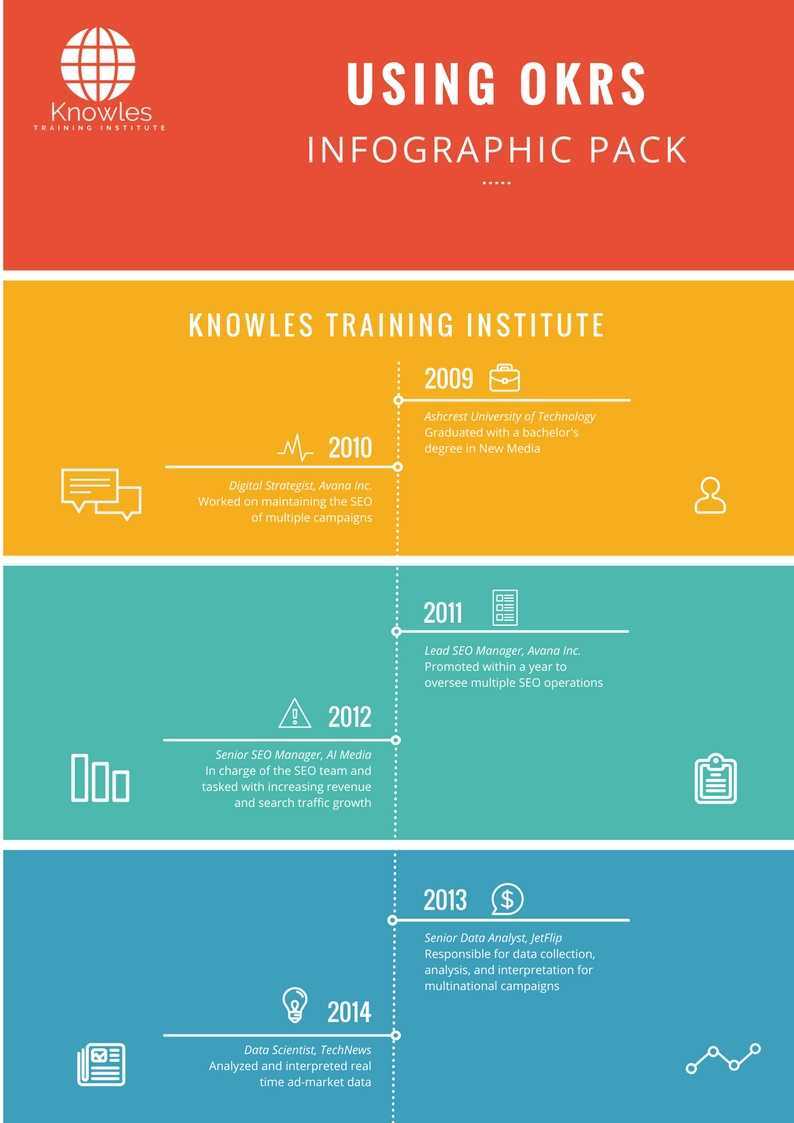
Using Okrs Certification
Each course participant will receive an OKR certification of training completion
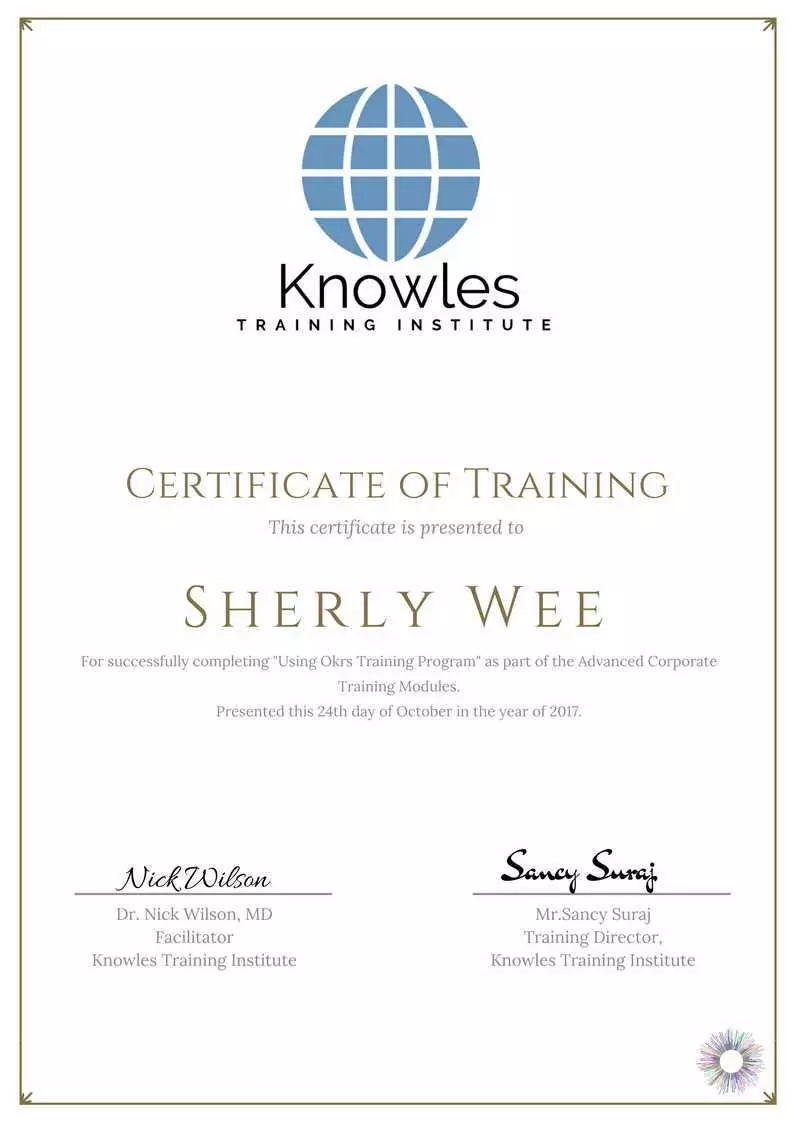
OKR Course Fees
There are 4 pricing options available for this Using Okrs training course. Course participants not in Singapore may choose to sign up for our online Using Okrs training course.
- SGD 1,334.96 For a 60-minute Lunch Talk Session.
- SGD 584.96 For a Half Day Course Per Participant.
- SGD 884.96 For a 1 Day Course Per Participant.
- SGD 1,184.96 For a 2 Day Course Per Participant.
Discounts available for more than 2 participants.
Upcoming Using Okrs Training Course Schedule
Contact us for the latest Using Okrs course schedules:
Phone: +65 6714 6663
Email: contact@knowlesti.com
Message:
OKR FAQs
What do OKRs stand for?
OKR stands for Objectives and key results. OKR is a method or framework for setting and tracking objectives and their key results.
What is the difference between KPI and Okr?
There is a difference between a KPI and OKR. OKR is a strategic framework, while KPIs are measurements that are within a framework. OKR is a simple, black-and- straight forward approach that uses distinct metrics to track the achievement of a set goal. Normally, a company will have around three to five high-level objectives and three to five key results per given objective.
What is Okr methodology?
OKR is alsoknown as Objectives and key results is a goal-setting methodology inspired by outcomes. In companies, OKRs are often used to guide outcome-based success. Using outcomes instead of tasks as a driver, OKRs encourage accountability in every step of achieving success through metric indicators.
How is Okr measured?
In an OKR, what is measured is the achievement rate of the objective. The objective is qualitative, and the key results are quantitative. Usually, this achievement rate is measured on a scale of 0 to 1.0. OKRs should be set high and seem impossible to accomplish.
How do you set an Okr goal?
- Keep your OKR simple.
- Concentrate on objectives that you know you can achieve yet make it ambitious.
- Be specific with your OKR.
- Cascade your objectives.
- Make your OKR measurable.
- Do not worry about stretch goals (The O in OKR).
- Break your key results in small goals.
- Celebrate and recognize successful OKRs.
How many OKRs should you have?
This is a great question that every organization embracing OKRs must answer for themselves. As a general rule of thumb, each set of OKRs should be in the range of 3-5 objectives with a fairly focused set of 2 or 3 key results to make the achievement of each objective measurable.
What is the Okr model?
The OKR model is a goal system used by Google and many other organisations worldwide. It is a really simple method to create engagement and alignment around measurable goals.
How does Okr work?
OKRs are meant to establish strategy and goals over a specified period of time for a company and teams within the company. At the end of a work period, your OKRs provide a reference to assess how well you did in achieving your objectives.
What is the point of OKRs?
There are many points and reasons of having OKR. The main purpose or point of OKRs is to align the organisation, team, and personal employee’s goals to measurable results while having all team members and leaders work together in unity, towards one direction.
Who invented OKR?
OKR has a really long history that can be traced back to 1954. It started when Peter Drucker invented Management by Objectives (MBO). In 1968 Andy Grove who is the co-founded Intel developed MBO into the OKR model. In 1974 John Doerr worked at Intel and learned OKR during his time there.
Does Google still use Okr?
For Google, an early adopter of OKRs, being on its third CEO means being on its third rendition of that process. … Now, as the CEO of Alphabet, he makes sure all of its subsidiaries — including Google — continue to use OKRs (and he still writes his own every quarter).
How do I run Okr workshop?
Keep the OKR setting session small and focused. Start big and then add enough detail so it’s completely clear what you want and how you’ll get there. Debate with the team, debate with other teams and stakeholders. Tweak and adjust until they’re just right.
How do you roll out OKRs?
Here are some useful tip to roll our OKRs without your organisation:
- Have a meeting and brainstorm your company OKRs.
- Collude with managers to draft their first set of department OKRs.
- Communicate and share the OKR methodology to the entire organisation.
- Make your employees draft their own OKRs.
What companies use OKR?
There are many companies that use OKR, here are some of them”
- Amazon.
- Google.
- Intel
- Airbnb
- Baidu.
- BMAT.
What is Okr agile?
OKR: an Agile Goal Setting Framework. OKR is a goal-setting framework that was created by Intel and used by several Silicon Valley organisation. Google is perhaps the most famous company to have adopted OKR in its first year.
What software does Google use for Okr?
As far as we know, Google does not have a standard OKR software for the entire organization. While there are some units that use dedicated OKR tools they developed internally, other teams use OKR software like ours from Work path. We are also in touch with Google teams that just organize their OKRs in Google Docs.
How do you prioritize OKRs?
Here is how you prioritise OKRs:
- Use numbers to make the Key Results part of your OKRs measurable.
- Attach your OKRs to larger company goals.
- Plan your OKRs as short, clear statements.
- Make your OKRs highly ambitious and even out of your own team’s comfort zone.
Download Using Okrs Course Brochure
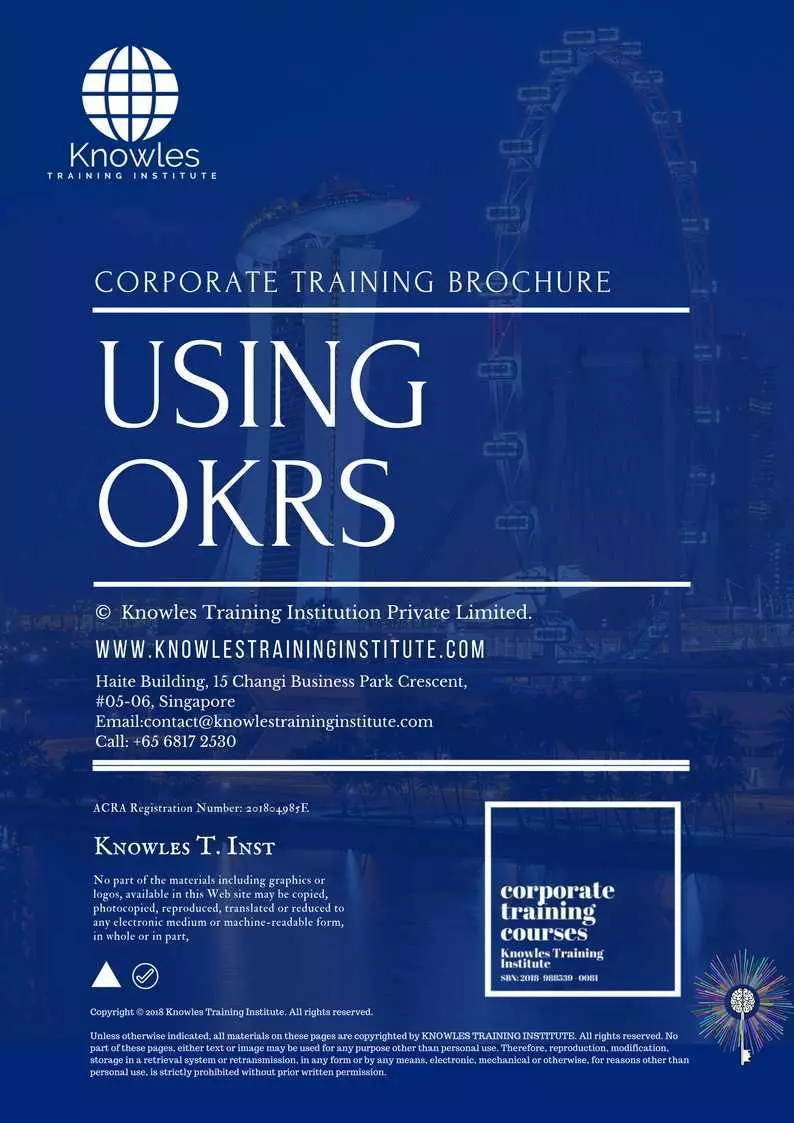
Request for this Using Okrs course brochure. Fill up the short information below and we will send it to you right away!
Post-Training Support: A vast majority of training does not have any effect beyond 120 days. But to work, training has to have a strong pre- and post-training component. Post-training reinforcement consequently helps individuals to recall the understanding and ask questions.
Blended Learning: Learning does not occur in the classroom. Virtually everybody prefers distinct ways of learning. Successful learning should have a multi-channel, multi-modal strategy.
We Understand The Industry: Similarly, we’ve got a profound comprehension of the business, business design, challenges, strategy and the that our participants are in and have designed the courseware to cater to their professional needs.
Course Content: Knowles Training Institute’s material is relevant, of high quality and provide specific learning outputs. As a result, Participants will leave the training course feeling as they have gained a strong understanding and will also be in a position to execute what they have learned sensibly.
Course Development — The workshop modules follow a systematic and logical arrangement. Therefore, this structure helps to ensure that the course material allows the facilitators to deliver the course in a logical arrangement. Consider the subjects as building bricks into learning, our facilitators slowly build towards a comprehensive picture of this entire topic.
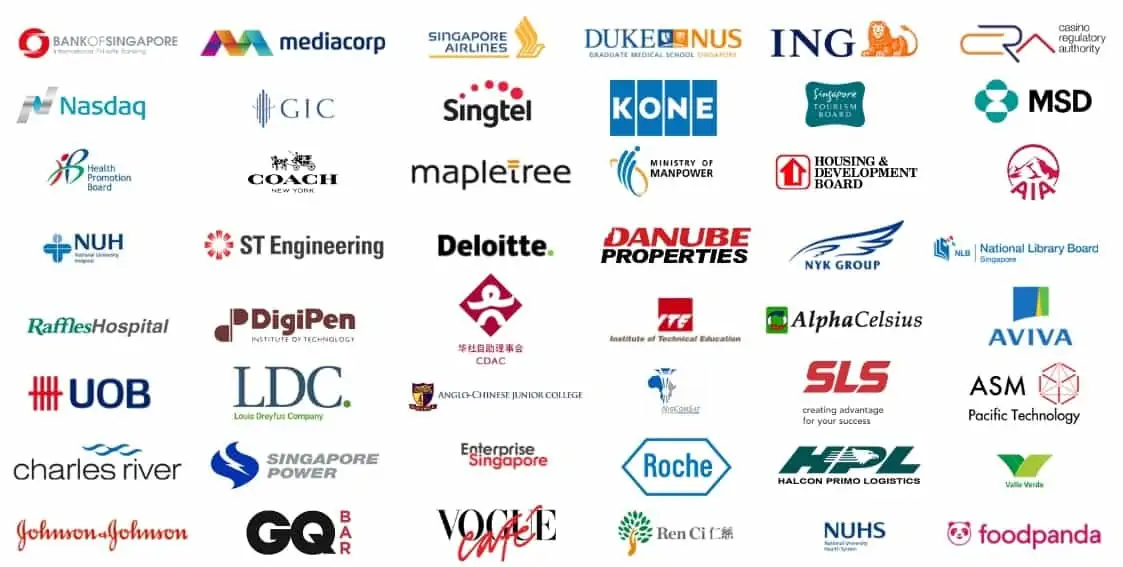

Course Enquiries
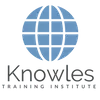
Fill up the form and we will get back to you in less than 1 working day.
Alternatively, give us a call to have one of our training consultants contact you. Our corporate training courses can be contextualized to meet your organization’s training needs. Leverage on our large pool of professional trainers and consultants for your organization’s training needs.
Office Address: 60 Paya Lebar Rd, #07-54 Paya Lebar Square, Singapore 409051
Office Phone: +65 6714 6663
Email: contact@knowlesti.sg
We Guarantee 100% Privacy. We Respect Your Privacy. Your Information Will Never Be Shared.


